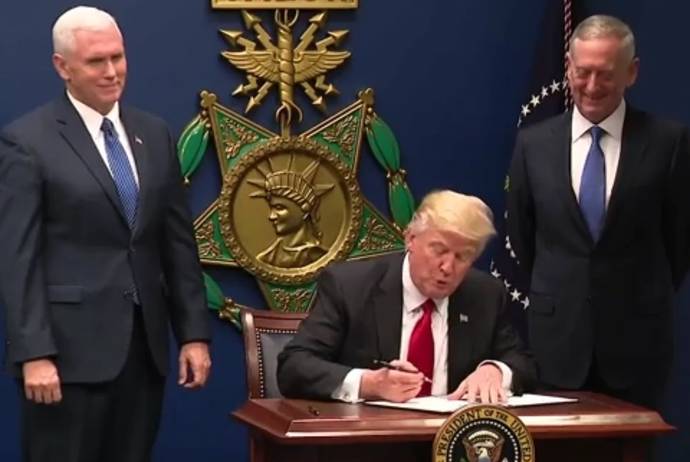Professoressa Ercolessi, vi sono opinioni contrastanti a proposito di come gli Stati Uniti si porranno dei confronti dei regimi autoritari. Lei crede che il disinteresse di Trump per la retorica della democrazia e i diritti umani potrà rafforzare la posizione di quei regimi autoritari, sia in Africa che altrove?
La mia impressione è che sì, potrebbe in effetti tendere a rafforzare regimi autoritari. Nel senso che, per come Trump si sta ponendo ora, ad esempio, con la Russia, questo elemento dell’autoritarismo non sembra essere così rilevante nella sua valutazione. Anzi, Trump sembra quasi prediligere regimi o dirigenti forti. Al massimo, l’elemento dell’autoritarismo, così come quello della corruzione, potrebbe essere agitato da Trump come un elemento pretestuoso, funzionalmente ad altri obiettivi.
Come si inserisce il terrorismo in questo contesto, e nel Continente Africano?
La war on terror, assieme alla sicurezza, sarà probabilmente una delle priorità della politica di Trump verso l’Africa. E dei regimi autoritari potrebbero essere funzionali al raggiungimento di obiettivi in questi settori d’azione.
Gli Stati Uniti sono impegnati da diversi anni nel contrastare il terrorismo di matrice islamica anche in Africa, finora con scarsi risultati. Cosa cambierà con Trump?
Se ci saranno eventi che coinvolgano direttamente personale o interessi americani, la reazione potrebbe essere di tipo militare. Quindi, da questo punto di vista potrà esserci continuità sulla politica che riguarda l’Africa Command, creato da Bush e mantenuto da Obama, che però ha insistito di più su intelligence e assistenza militare che non su interventi diretti.
Come si connette tutto questo con l’immigrazione e la diaspora africana negli Stati Uniti, fortemente interessati dal Muslim ban?
Un elemento molto importante è in effetti legato alle politiche migratorie, soprattutto per coloro che provengono da zone sensibili e compromesse col terrorismo. Quindi, ad esempio, i siriani, ma anche i sudanesi, i somali e i libici, inclusi nel discusso ordine esecutivo revisionato pochi giorni fa. Esiste quindi una dimensione interna – quale la presenza di rifugiati e migranti negli Stati Uniti e le sensibilità dell’opinione pubblica– che si lega a una dimensione esterna: le politiche nei confronti dell’Africa.
L’immigrazione è un tema centrale in tutte le destre populiste. In Italia, è sotto i riflettori la questione degli sbarchi dei migranti, in gran parte provenienti dall’Africa sub-sahariana. Ma esiste una soluzione diversa dalla chiusura dei confini?
L’idea che chiudere i confini sia la risposta – e questo vale sia per il Messico che per noi – è per me non solo totalmente sbagliata sul piano dei valori e dei principi di una politica mediterranea, ma anche totalmente inefficace ed irrealistica. I muri non fermano i flussi, li rendono solo più pericolosi e“illegali”. Chiusa una rotta in genere se ne apre un’altra. L’Africa sta conoscendo una forte crescita demografica e la sua popolazione è molto giovane; quindi la spinta a migrare (in cerca di maggiori opportunità) continuerà per parecchio tempo ancora. Sarebbe necessario provare a regolare, non bloccare i flussi migratori, e applicare delle politiche di accompagnamento. Un esempio di politica possibile è costituito dai corridoi umanitari. Si eviterebbero almeno le circa cinquemila morti all’anno che avvengono nel Mediterraneo.
Qual è invece la sua opinione riguardo agli interventi nei paesi di origine e transito delle migrazioni?
Non credo nelle politiche che cercano di fermare i flussi migratori direttamente nei paesi di origine e transito. L’idea di spostare la frontiera europea sempre più a Sud, nel Sahara, aumentando la cooperazione militare con questi paesi in modo che rafforzino i controlli dei loro confini, è secondo me discutibile quanto pericolosa. Inoltre, finora non ha funzionato. Questo tipo di interventi lascia ai regimi o alle milizie locali la possibilità di usare i flussi come uno strumento politico. Possono bloccarli quando lo ritengono opportuno e sbloccarli quando hanno interesse a mettere in difficoltà i loro partner europei.
Cosa andrebbe fatto quindi, secondo lei, sul tema delle migrazioni?
Andrebbe innanzitutto accettata l’idea che non si tratta di una emergenza, ma di un fenomeno strutturale di lunga durata, e che quindi l’Europa deve approntarsi ad affrontare una sfida epocale, in cui cambierà tutto, anche la stessa società europea. Cosa che naturalmente potrà creare tensioni, e le sta già creando. L’ascesa della destra populista ne è un riflesso.
In secondo luogo vi sono i piani di cooperazione economica per lo sviluppo dei paesi di partenza. Possono essere utili, ma bisogna anche essere consapevoli del fatto che ottengono risultati nel lungo periodo (mentre i governanti, sotto la pressione di una opinione pubblica populista, tendono a rispondere nel breve periodo) e che prevedono grandi investimenti. Inoltre questi processi di dinamizzazione dell’economia dovrebbero incorporare due elementi. Uno è l’occupazione: serve una crescita diversa da quella che sta avendo luogo adesso, in cui non viene creato lavoro per l’enorme numero di giovani africani. Il secondo elemento a cui questi processi economici dovrebbero rispondere sono le diseguaglianze. Perché in caso contrario la crescita rischia di nuovo di fermarsi e di creare ulteriori scompensi, col risultato di aumentare i fenomeni di migrazione.
Un terzo asse d’azione è quello del co-sviluppo, in cui le rimesse economiche delle diaspore presenti in Europa sono utilizzate per favorire forme di sviluppo nel paese di origine. Questo è un altro punto che si considera poco quando si parla di bloccare le migrazioni. Ci sono paesi in Africa, in cui le rimesse dei migranti dall’estero hanno un peso considerevole nel Pil.































